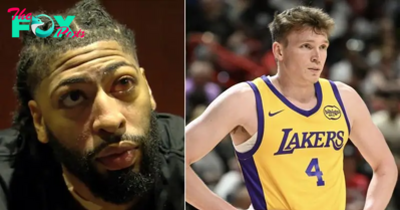NBA
Michael Jordan’s Secret Plan To Come Out Of NBA Retirement Again
Michael Jordan is arguably the greatest player of all time. Aside from his many accomplishments, the other thing he is known for is retiring and then un-retiring from the league on multiple occasions.
Jordan officially retired for the last time after the 2002-03 season – or so everyone thought.
This week, Andre Iguodala revealed that Jordan actually planned another secret comeback to the NBA that nobody was aware of.
“When I was coming in as a rookie, MJ was trying to come back again,” Iguodala revealed during a Twitch stream with Kai Cenat
“We just sat him down forever. People don’t know this. He was hooping with us. He was trying to figure out if he wanted to hoop again. MJ just loved hooping.”
Andre iguodala says Michael Jordan tried to come back to the NBA when he was a rookie pic.twitter.com/TVNzNkqSwu
— 2Cool2Blog (@2Cool2Blog) November 18, 2024
Obviously Jordan never actually returned, but it would have been fascinating to see him try if he had opted to do so publicly. It definitely was the first few times he did it.
Jordan, widely regarded as the greatest basketball player of all time, shocked the sports world with his decision to retire from the NBA in 1993. At the peak of his career, having just led the Chicago Bulls to their third consecutive championship, Jordan stepped away from the game at age 30. His retirement came after nine seasons in the league, during which he had transformed basketball and become a global icon.
Jordan’s departure left fans and analysts stunned, sparking intense speculation about his motives. While he cited a loss of desire to play, his father’s tragic death earlier that year also weighed heavily on his decision. The abrupt exit of such a dominant force in the sport created a void in the NBA and raised questions about the future of the Chicago Bulls dynasty.
Though Jordan would eventually return to basketball in 1995, his first retirement marked a significant moment in sports history. It demonstrated the unpredictable nature of athletic careers and the personal struggles that can impact even the most seemingly invincible stars. Jordan’s decision to walk away at the height of his powers remains a topic of fascination and discussion among sports enthusiasts to this day.
The First Retirement: 1993
Michael Jordan shocked the sports world by announcing his retirement from basketball on October 6, 1993. This decision came at the peak of his career, following three consecutive NBA championships with the Chicago Bulls.
Context of the Decision
Jordan’s retirement came after a tumultuous year. The Bulls had just completed their first three-peat, with Jordan leading the team to victory in the 1993 NBA Finals against the Phoenix Suns.
However, tragedy struck in July when Jordan’s father, James, was murdered. This devastating loss deeply affected Jordan and influenced his decision to step away from basketball.
At 30 years old, Jordan cited a loss of desire to play the game as a key factor in his retirement. He expressed a need for new challenges and a break from the intense spotlight of his NBA career.
Impact on the Chicago Bulls
Jordan’s departure left a massive void in the Bulls’ lineup. The team struggled to maintain their championship form without their superstar leader.
In the 1993-94 season, the Bulls’ record dropped from 57-25 to 55-27. While still impressive, they failed to reach the NBA Finals for the first time in four years.
Scottie Pippen stepped up as the team’s primary scorer and leader, earning All-Star honors. However, the Bulls lacked Jordan’s clutch performances and unmatched comPetitiveness.
The team’s dynamics shifted, forcing players like Horace Grant and B.J. Armstrong to take on larger roles.
Reactions from the Media and Fans
Jordan’s retirement announcement sent shockwaves through the Sports world. Media outlets scrambled to cover the story, with many expressing disbelief and disappointment.
Fans were stunned by the news. Jordan was at the height of his powers, and many expected him to continue dominating the league for years to come.
Some speculated about hidden reasons for his retirement, including rumors of gambling issues. These theories persisted despite Jordan’s clear statements about his motivations.
The NBA faced a significant challenge in marketing the league without its biggest star. Television ratings and merchandise sales took a hit in Jordan’s absence.
Baseball Interlude: A Brief Career in Minor League Baseball
Michael Jordan’s unexpected retirement from basketball in 1993 led to a surprising foray into professional baseball. He joined the Chicago White Sox organization and played for their Double-A affiliate, the Birmingham Barons, in 1994.
Jordan’s Time with the Birmingham Barons
Jordan signed with the White Sox in February 1994 and was assigned to the Birmingham Barons. He wore number 45, the same number he had worn playing baseball in high school. The Barons saw a surge in attendance and media attention due to Jordan’s presence.
Jordan’s transition to baseball was challenging. He struggled with hitting curveballs and adjusting to the daily grind of minor league life. Despite these difficulties, Jordan’s work ethic impressed his teammates and coaches.
Performance and Skill Development
Jordan batted .202 in his lone season with the Barons. He hit 3 home runs, drove in 51 runs, and stole 30 bases in 127 games. While these numbers were modest, they were considered respectable for someone who hadn’t played baseball competitively in over a decade.
Jordan’s speed and athleticism translated well to the outfield. He made steady improvements throughout the season, particularly in his hitting mechanics and plate discipline. His manager, Terry Francona, praised Jordan’s dedication and progress.
Despite his efforts, Jordan’s baseball career was short-lived. He returned to the NBA in March 1995, ending his brief but memorable stint in professional baseball.
Return to the NBA: The 1995 Comeback
Michael Jordan’s return to basketball in 1995 sent shockwaves through the sports world. His comeback reinvigorated the Chicago Bulls and set the stage for another dominant run in the NBA.
Announcement and Immediate Effects
On March 18, 1995, Jordan announced his return to the NBA with a simple two-word fax: “I’m back.” This declaration ended his 17-month retirement and baseball stint. The news instantly generated massive excitement among fans and media.
Jordan made his on-court return on March 19 against the Indiana Pacers. He wore number 45, as his iconic 23 had been retired by the Bulls. In his first game back, Jordan played 43 minutes and scored 19 points.
The returning superstar faced initial challenges. His shooting accuracy was below his usual standards, and he needed time to regain his basketball conditioning. Despite this, Jordan’s presence immediately boosted team morale and ticket sales.
Contribution to the Bulls’ Success
Jordan’s impact on the Bulls’ performance was significant, though not immediate. The team’s record improved after his return, but they were eliminated in the Eastern Conference Semifinals by the Orlando Magic.
This playoff loss fueled Jordan’s competitive fire. He spent the offseason rigorously training to regain his peak form. The following season, Jordan led the Bulls to a record-breaking 72-10 regular season.
Jordan’s comeback culminated in three more NBA championships from 1996 to 1998, completing his second three-peat. He won the NBA Finals MVP award each year, solidifying his status as one of the greatest players in basketball history.
The Second Retirement: 1999
Michael Jordan shocked the basketball world on January 13, 1999 by announcing his retirement from the NBA for the second time. This decision marked the end of his legendary career with the Chicago Bulls and left an indelible impact on the sport.
End of an Era
Jordan’s second retirement came after leading the Bulls to their sixth championship in eight years. At age 35, he stepped away from basketball at the height of his powers. The announcement took place during a press conference at the United Center in Chicago.
Jordan cited his desire to leave the game on top as a key factor. He expressed confidence in his choice, stating he was “99.9 percent” certain it was final. The retirement coincided with the end of the Bulls’ dynasty, as key teammates and coach Phil Jackson also departed.
Legacy and Achievements
By 1999, Jordan had cemented his status as one of the greatest basketball players ever. His career achievements included:
- 6 NBA championships
- 6 NBA Finals MVP awards
- 5 NBA regular season MVP awards
- 10 scoring titles
- 14 All-Star selections
Jordan’s impact extended far beyond statistics. He revolutionized the game with his athleticism and competitive drive. His global popularity helped grow the NBA’s audience worldwide.
Though he left at the peak of his abilities, Jordan’s legacy as a cultural icon and basketball legend was firmly established. His retirement marked the end of a transformative era in NBA History.
Washington Wizards: The Final Chapter
Michael Jordan’s tenure with the Washington Wizards marked the unexpected conclusion to his storied NBA career. This period saw Jordan transition from the front office back to the court before ultimately retiring for good.
Comeback to Play for the Wizards
In September 2001, Michael Jordan announced his return to the NBA as a player for the Washington Wizards. He had previously served as part-owner and president of basketball operations for the team. Jordan’s comeback generated significant excitement and media attention.
At 38 years old, Jordan averaged 22.9 points per game in his first season back. He demonstrated flashes of his former brilliance but struggled with injuries and inconsistency. The Wizards failed to make the playoffs in both of Jordan’s seasons with the team.
Jordan’s final NBA game took place on April 16, 2003, against the Philadelphia 76ers. He scored 15 points in a 107-87 loss.
Retirement and Transition to Management
Jordan retired for the third and final time following the 2002-03 season. He expected to return to his front office role with the Wizards but was surprisingly dismissed by team owner Abe Pollin.
A longtime sports reporter, Carlos Garcia has written about some of the biggest and most notable athletic events of the last 5 years. He has been credentialed to cover MLS, NBA and MLB games all over the United States. His work has been published on Fox Sports, Bleacher Report, AOL and the Washington Post.
-
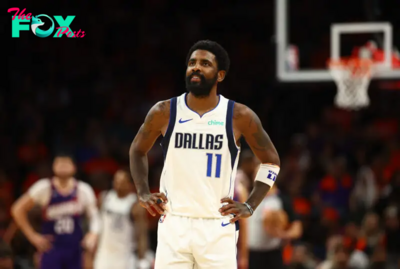
 NBA1h ago
NBA1h agoDallas Mavericks vs New Orleans Pelicans Prediction 11-19-24 NBA Picks
-
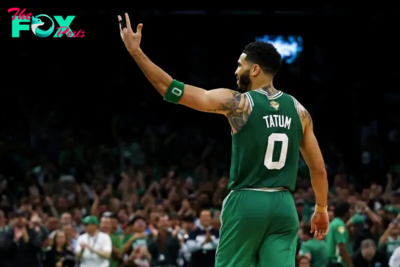
 NBA1h ago
NBA1h agoBoston Celtics vs Cleveland Cavaliers Player Prop Picks 11-19-24 Picks
-
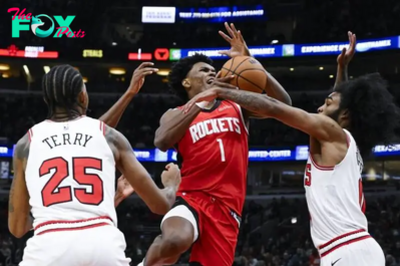
 NBA3h ago
NBA3h agoDetroit Pistons vs. Chicago Bulls odds, tips and betting trends | November 18, 2024
-
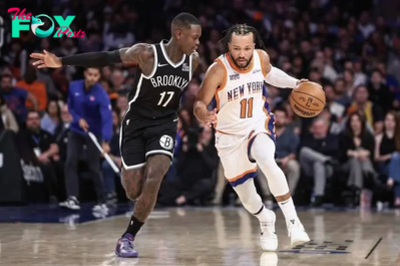
 NBA3h ago
NBA3h agoNew York Knicks vs. Washington Wizards odds, tips and betting trends | November 18, 2024
-
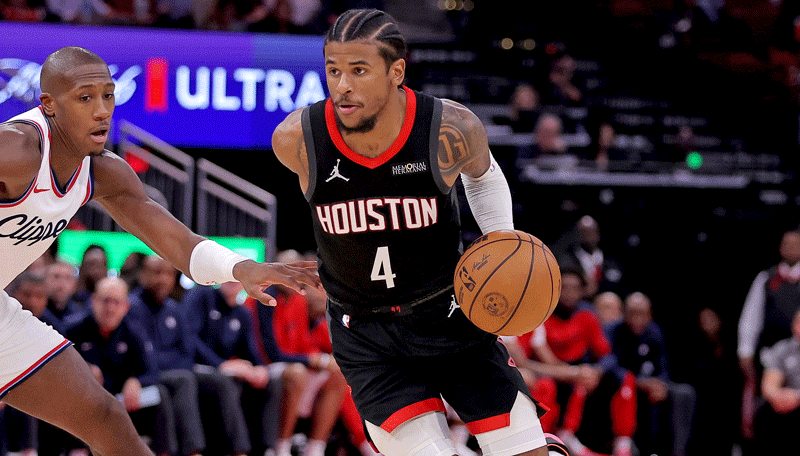
 NBA4h ago
NBA4h agoRockets vs Bucks Prediction, Picks, & Odds for Tonight’s NBA Game
-
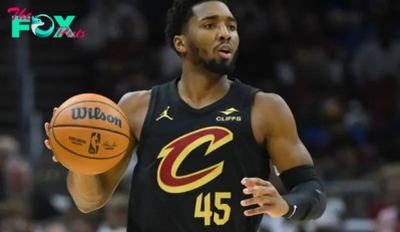
 NBA4h ago
NBA4h agoCleveland Cavaliers Odds: When Will Cavs Lose First Game of the Season?
-
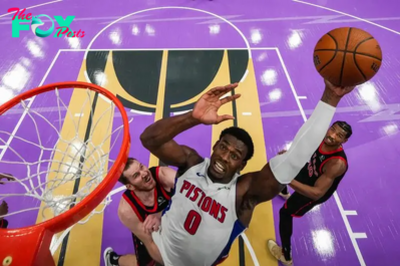
 NBA5h ago
NBA5h agoWhat’s behind Detroit Pistons’ remarkable transformation?
-
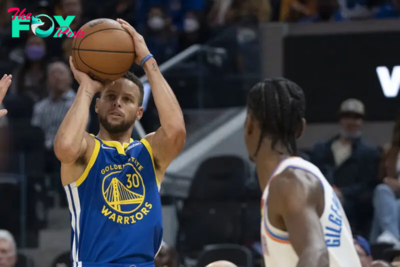
 NBA7h ago
NBA7h agoLA Clippers vs Golden State Warriors Prediction 11-18-24 NBA Picks
